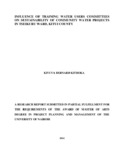| dc.description.abstract | One important means to manage effectively water resources is to build the capacities of the concerned institutions, managerial systems, and human resources. The key to sustainable water resources management is the existence of sufficiently well trained personnel in all of the disciplines needed in the planning, development, and management processes. The purpose of the study was mainly to assess the influence of training on sustainability of community water projects in Tseikuru ward, in Mwingi North constituency of Kitui County. The study was guided by the following objectives; to establish the extent to which management training influence on sustainability of community water projects, to determine how acquisition of technical operation skills training influence sustainability of community water projects, to assess the extent to which maintenance training influence sustainability of community water projects and also to determine how acquisition of resource mobilization skills influence sustainability of community water projects. The study was anchored under the behaviour change theory developed by B.F Skinner. The study also used mixed method research approach, sampling 92 committee members out of the total population of 120 committee members from 15 water projects. Descriptive survey design was employed, with all the existing water management committees in the area of study reached, through representation. Data was collected using questionnaires and Key Informant Interviews. Data analysis was done using Statistical Package for Social Sciences (SPSS). Descriptive statistics such as frequencies, percentages, means and standard deviations were used to analyze the data which is presented in tables. The findings of the study revealed that, acquisition of management skills, technical operation and maintenance skills as well as acquisition of resource mobilization skills by water uses committees highly influence the sustainability of community water projects. The study further provides recommendations on improvements and policy measures on water resources management, by calling for effective implementation of the Water Act 2002 which advocates for Human Based Rights Approach. The study recommends empowerment of people to be able to make their own decisions, rather than being passive objects of choice and also enable them claim their rights to opportunities and services through pro-poor development. | en_US |

